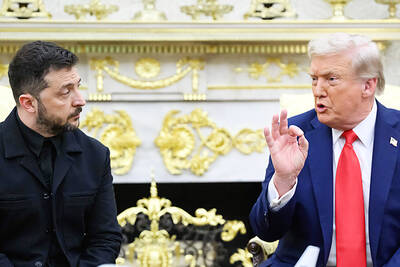The Japanese government is under fire over a plan to allow police to arrest people for plotting illegal activities, with opponents charging it is a step toward wiretapping and curbs on free speech.
Concerned by the rising global threat of terrorism, Prime Minister Junichiro Koizumi's government is seeking to ratify a UN convention against international crime before parliament recesses on June 18.
But it was stalled last week in a parliamentary committee amid strong protests against the security bill, which would revise domestic laws to create the charge of conspiracy even if a suspect did not carry out a crime.
Japan has signed the UN Convention Against Transnational Organized Crime and 120 other nations have ratified it, although they have implemented the treaty in different ways.
But in Japan, conspiracy charges conjure up unwelcome images of the past, as the militarist government during World War II used them to silence critics.
The debate also comes amid the furor in the US over President George W. Bush's authorization of wiretaps on telephone calls and screening of e-mails without court approval.
The Japan chapter of PEN, an international human rights organization whose members are authors and journalists, said the bill was too ambiguous and would allow authorities to abuse their power.
Dark shadows
"Dark shadows are about to cover this democratic nation," it said in a statement.
The Japan Federation of Bar Association has also declared its opposition.
"Since what people say in conversations, phone calls or e-mails would be subject to charges, investigators may try to justify wiretapping and e-mail censorship, bringing further surveillance to society," it said.
Under pressure, Koizumi's ruling Liberal Democratic Party and the opposition Democratic Party of Japan are revising their proposals, but the government has remained committed to passing a bill in the current parliamentary session.
The government said the measures are necessary to battle the country's powerful crime syndicates and terrorist networks.
Japan has been repeatedly threatened in statements from al-Qaeda over its troop deployment to Iraq.
"Time and time again I have said that this applies only to organized criminals," Justice Minister Seiken Sugiura said recently.
"Some people may have interpreted further and developed suspicions that this would also apply to labor unions or civic groups. That speculation may have concerned people, but there's nothing to worry about," he said.
But an official from the opposition Democratic Party in charge of drafting a counterproposal said the government bill would loosen current law, under which prosecutors must prove evidence of actual criminal acts.
Deterrents
The official, who asked for anonymity, added: "As long as the nation has decided to conclude the international convention, we have to do it with as many deterrents as possible to prevent charges from being employed arbitrarily."
Japan still remembers the wartime Peace Preservation Law, which was intended to crush the communist movement but in practice allowed police to target anyone opposed to the government.
Under the law, some 60 journalists, editors and other publishing workers were arrested between 1942 and 1945 in what is now known as the "Yokohama Incident," as they were all detained in the city outside Tokyo. At least seven died either in jail or later from injuries allegedly sustained during torture.

Shamans in Peru on Monday gathered for an annual New Year’s ritual where they made predictions for the year to come, including illness for US President Donald Trump and the downfall of Venezuelan President Nicolas Maduro. “The United States should prepare itself because Donald Trump will fall seriously ill,” Juan de Dios Garcia proclaimed as he gathered with other shamans on a beach in southern Lima, dressed in traditional Andean ponchos and headdresses, and sprinkling flowers on the sand. The shamans carried large posters of world leaders, over which they crossed swords and burned incense, some of which they stomped on. In this

Near the entrance to the Panama Canal, a monument to China’s contributions to the interoceanic waterway was torn down on Saturday night by order of local authorities. The move comes as US President Donald Trump has made threats in the past few months to retake control of the canal, claiming Beijing has too much influence in its operations. In a surprising move that has been criticized by leaders in Panama and China, the mayor’s office of the locality of Arraijan ordered the demolition of the monument built in 2004 to symbolize friendship between the countries. The mayor’s office said in

‘TRUMP’S LONG GAME’: Minnesota Governor Tim Walz said that while fraud was a serious issue, the US president was politicizing it to defund programs for Minnesotans US President Donald Trump’s administration on Tuesday said it was auditing immigration cases involving US citizens of Somalian origin to detect fraud that could lead to denaturalization, or revocation of citizenship, while also announcing a freeze of childcare funds to Minnesota and demanding an audit of some daycare centers. “Under US law, if an individual procures citizenship on a fraudulent basis, that is grounds for denaturalization,” US Department of Homeland Security Assistant Secretary Tricia McLaughlin said in a statement. Denaturalization cases are rare and can take years. About 11 cases were pursued per year between 1990 and 2017, the Immigrant Legal Resource

‘RADICALLY DIFFERENT’: The Kremlin said no accord would be reached if the new deal with Kyiv’s input did not remain within the limits fixed by the US and Russia in August Ukrainian President Volodymyr Zelenskiy is to meet US President Donald Trump in Florida this weekend, but Russia on Friday accused him and his EU backers of seeking to “torpedo” a US-brokered plan to stop the fighting. Today’s meeting to discuss new peace proposals comes amidst Trump’s intensified efforts to broker an agreement on Europe’s worst conflict since World War II. The latest plan is a 20-point proposal that would freeze the war on its current front line, but open the door for Ukraine to pull back troops from the east, where demilitarized buffer zones could be created, according to details revealed by